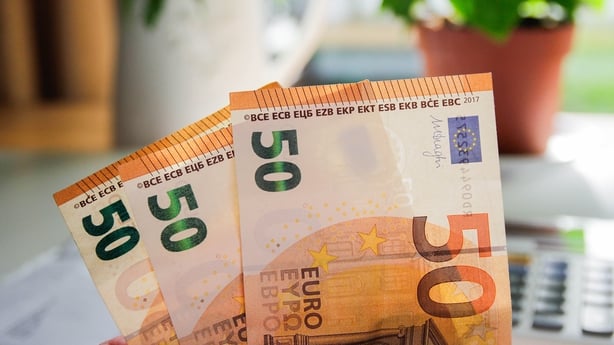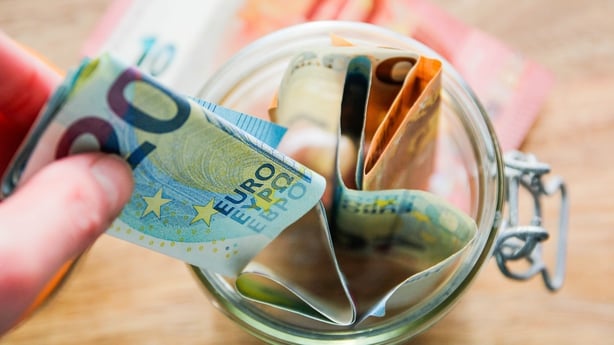Consumer sentiment fell for the fourth month in a row in May, new data shows.
The latest consumer sentiment index from the Credit Union reveals that cost of living concerns are still hitting confidence.
While the rate of inflation has eased, the report suggests that consumers are disappointed that conditions aren't improving as fast as they had hoped.
On a positive note, the fall in consumer confidence in recent months is relatively modest, with sentiment less negative than it was last year.
The survey shows an index reading of 65.7 for May, down from the April figure of 67.8.
Economist, Austin Hughes, who is author of today's report said it is unusual for Irish consumer sentiment to fall for four months in a row.
"We think the decline in sentiment through the past four months reflects a significant but not substantial change in consumer thinking," he said.
"Notwithstanding reasonably encouraging signs of economic growth and a sharp slowdown in inflation, most Irish consumers appear to need much stronger evidence of a broad-reaching improvement to be convinced that the current trajectory of the economy and their household finances is positive rather than problematic," he added.
We need your consent to load this rte-player contentWe use rte-player to manage extra content that can set cookies on your device and collect data about your activity. Please review their details and accept them to load the content.Manage Preferences
Mr Hughes said there have only been five previous occasions in the 28-year history of the sentiments series in which confidence dropped for four months in a row.
"The most recent was two years ago in the immediate aftermath of Russia's invasion of Ukraine," he said.
"Before that, it was in 2019, when a disorderly Brexit was threatened.
"There were also two periods of four month drops in sentiment during the financial crash and one prior to that in 2002 in the aftermath of the Dot-com collapse," he added.
The report notes that the fall in consumer confidence from February to May followed four successive monthly increases between October and January.
"The 8.5-point cumulative decline in Irish consumer sentiment over the past four months reverses a little over half the 15.4-point gain in the index seen in the previous four months," Mr Hughes explained.
The survey shows that consumer thinking on the general economic outlook weakened modestly for the fourth month in a row.
In contrast, consumers were less negative on job prospects in May compared to the previous month.
The report suggests that a relatively quiet May in terms of jobs news and layoffs may have eased some of the concerns that emerged in April.
Household finances

The weakest elements of the May survey were those focused on household finances.
The data shows that consumers were more downbeat on how their household finances have evolved over the past 12 months.
There was also a deterioration in the outlook for household finances over the next year.
Mr Hughes said there could be several reasons for this.
"First of all, while inflation data for April show a further easing, there were significant month-on-month price increases in key areas such as food, drink and clothing prices," he said.
"In addition, excluding volatile airfares and package holiday costs, the annualised increase in consumer prices over the past three months is running at around 5%, a notably hotter pace than the 2.6% year-on-year headline figure for April," he added.
The report also states that rising energy costs played a role in the weaker sentiment reading for May.
"The latest survey period saw a further increase in carbon taxes which coincided with motor fuel prices increasing to their highest level in six months," Mr Hughes explained.
"Movements in energy prices have tended to prompt movements in consumer sentiment in the opposite direction since the cost-of-living crisis began to bite," he added.
On a more positive note, the survey points towards an increase in overall consumer spending throughout this year, rather than a slump or surge at either extreme.
Dealing with an unexpected expense

This latest survey asked consumers how, or if they could handle an unexpected financial expense costing €1,000.
Just over half said they would draw on savings or income, about one in four would borrow from a financial lender, family or friends, while almost one in five said they wouldn't be able to handle such an emergency or would have to sell something.
Mr Hughes said these findings suggest a three-tier structure among Irish consumers at the moment.
"Just over half of Irish consumers might be deemed 'comfortable’ as they could handle a financial emergency by drawing on savings or income," he said.
"About one in four consumers might be described as ‘coping’ in that they could deal with a financial emergency by borrowing from a variety of sources including both financial lenders and family and friends.
But he said some of these borrowers might be classified as part of the third group, those 'clinging on'.
"This group, that includes those who say they couldn’t handle an unexpected bill of €1,000, those who say they would sell something and probably some element of those borrowing from sources other than a bank or credit union," he said.
US consumer confidence

Today's report points out that Ireland is not alone when it comes to weaker consumer sentiment readings.
The preliminary May consumer sentiment figure for the US saw a marked weakening.
Mr Hughes said the broad trend in Irish and US consumer sentiment has been broadly comparable in recent years.
"In terms of confidence, Irish consumers have responded more negatively than their US counterparts to the pandemic and the Russian invasion of Ukraine but more stubbornly entrenched inflation and the related prospect of higher interest rates for longer, together with increasing uncertainty ahead of the November US Presidential election, appear to have weighed heavily on the mood of consumers in the ‘States of late," he said.
"Again, we would suggest that as in the case of their Irish counterparts, consumers in the US seem to think that progress has been less marked and problems more lasting than had been expected some months ago," he added.







